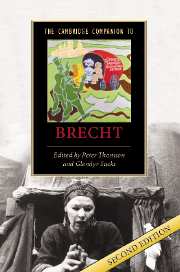Book contents
- Frontmatter
- Part I Context and Life
- Part II The Plays
- Part III Theories and Practices
- 12 Brecht and the Berliner Ensemble - the making of a model
- 13 Revolutionising theatre: Brecht’s reinvention of the dramaturg
- 14 Key words in Brecht’s theory and practice of theatre
- 15 Brecht’s poetry
- 16 Brecht and music: theory and practice
- 17 Brecht and stage design: the Bühnenbildner and the Bühnenbauer
- 18 Actors on Brecht
- 19 Brecht and film
- Bibliography
- Index
- Series List
16 - Brecht and music: theory and practice
from Part III - Theories and Practices
Published online by Cambridge University Press: 28 March 2007
- Frontmatter
- Part I Context and Life
- Part II The Plays
- Part III Theories and Practices
- 12 Brecht and the Berliner Ensemble - the making of a model
- 13 Revolutionising theatre: Brecht’s reinvention of the dramaturg
- 14 Key words in Brecht’s theory and practice of theatre
- 15 Brecht’s poetry
- 16 Brecht and music: theory and practice
- 17 Brecht and stage design: the Bühnenbildner and the Bühnenbauer
- 18 Actors on Brecht
- 19 Brecht and film
- Bibliography
- Index
- Series List
Summary
Brecht asserted in a 1935 essay that it was music which 'made possible something which we had long since ceased to take for granted, namely the “poetic theatre”' (BT, pp. 84-90). Music provided him with a powerful mechanism to reclaim and refunction in 'epic drama' the presentational mode of address, long a standard convention in most forms of music-theatre but discarded by modern drama after the 'fourth wall' had been dismantled by naturalism and realism. Brecht's relationship to music, therefore, was as essential as it was complex. Although little interested in musical repertoire or issues extraneous to his efforts in the theatre, ironically Brecht first gained wide public recognition through the musical settings of his works: opera librettos, plays with music, a ballet, dramatic cantatas, an oratorio, musical films, even commercial jingles. By 1931, music critic Hans Mersmann could even proclaim: 'New Music in Germany has found its poet. This poet is Bertolt Brecht.' Although Brecht thereafter showed little interest in serving the modernist agenda of 'New Music', only one of his nearly fifty completed dramatic works lacks music. Over 600 of his more than 1,500 poems refer to musical genres in title or structure; intended as songs, most were set as such during his lifetime. Subsequently, despite copyright disincentives, there have been well over a thousand additional settings, including many by major composers.
- Type
- Chapter
- Information
- The Cambridge Companion to Brecht , pp. 242 - 258Publisher: Cambridge University PressPrint publication year: 2006



